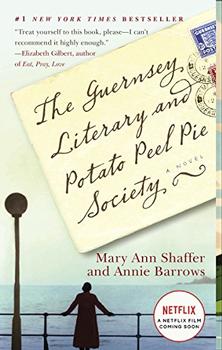Summary | Excerpt | Reading Guide | Reviews | Beyond the Book | Read-Alikes | Genres & Themes | Author Bio

This article relates to The Guernsey Literary and Potato Peel Pie Society
The Channel Islands are a group of islands approximately 30 miles off the coast of Normandy, France (map).
They are organized into two bailiwicks: The Bailiwick of Guernsey (made of up of the islands of Guernsey, Alderney, Sark, Herm, Jethou, Brecqhou and Lihou), and the Bailiwick of Jersey (containing the island of Jersey and a few smaller, uninhabited islets).
Despite being closer to the French coast than they are to Britain, the islands are a self-governing possession of the British Crown. This state of events came about because the islands were annexed to the Duchy of Normandy in 933 and thus became part of the lands of Duke William of Normandy in 1035. When William invaded England in 1066, becoming William I of England (better known as William The Conqueror), he brought with him his existing territories including the Channel Islands. About 150 years later, in 1204, King John lost England's remaining French lands (earning him the nickname Lackland) so the possession of the Channel Islands transferred from Normandy to England.
Because the Channel Islands are not part of the United Kingdom they are not represented in Parliament and pay no taxes to the United Kingdom. The Islands have their own governments and currency. The island of Guernsey, where most of The Guernsey Literary and Potato Peel Pie Society is set, is roughly 24 square miles, with a population of approximately 60,000 (2001).
The Channel Islands were the only part of the British Commonwealth to be invaded and occupied by German forces in World War II. Nazi troops landed on 30 June 1940, and remained on the islands until their surrender on 9 May 1945.
The British government made a conscious decision to leave the Channel Islands undefended as the Germans advanced in 1940. Its reasoning was that the islands were not of strategic importance and therefore allowing the Germans to invade them would tie up German troops, preventing them from being deployed to more important battles.
The British provided ships to help the islanders leave ahead of the invasion, with each island forming their own policy regarding evacuation. Some island governments advised the evacuation of their entire population, while some directed their residents to stay put. On Guernsey, only school-age children were offered the option of leaving. Many of the children departed on ships to live with relatives or, in some cases, total strangers.
The invasion at first was cautious; German tacticians were unaware of the fact that the British military had been completely withdrawn from the area. Inconclusive reconnaissance flights were followed by bombing raids on 28 June 1940. Forty-four people were killed throughout the islands during this attack. The island of Guernsey surrendered to a German pilot soon after.
The Channel Islands offered very little active resistance to the Germans for a number of reasons. Most of the able-bodied men had already left to join the British Army. In addition, the ratio of German soldiers to islanders was very high – in some cases, one soldier to every two citizens. Finally, being small and not densely populated, the islands provided few hiding places for resistance members.
The Germans heavily fortified the Channel Islands, importing slave labor from its concentration camps to lay mines and build bunkers. These fortifications were so formidable that when the Allies liberated Normandy in June 1944, they bypassed the Channel Islands completely, considering them impregnable. The end result was that all supply lines to the islands were cut. Both German troops and civilians, already short on supplies, came close to starvation. The International Red Cross was permitted to send a ship with food and medical supplies to Guernsey in December 1944, but this and subsequent aid efforts provided only minimal relief. The islands were not liberated until World War II ended, almost a year later. The HMS Bulldog arrived at St. Peter Port, Guernsey, on the morning of 9 May 1945. The German forces surrendered at dawn, officially ending the occupation.
Filed under Places, Cultures & Identities
![]() This "beyond the book article" relates to The Guernsey Literary and Potato Peel Pie Society. It originally ran in August 2008 and has been updated for the
May 2009 paperback edition.
Go to magazine.
This "beyond the book article" relates to The Guernsey Literary and Potato Peel Pie Society. It originally ran in August 2008 and has been updated for the
May 2009 paperback edition.
Go to magazine.
Your guide toexceptional books
BookBrowse seeks out and recommends the best in contemporary fiction and nonfiction—books that not only engage and entertain but also deepen our understanding of ourselves and the world around us.